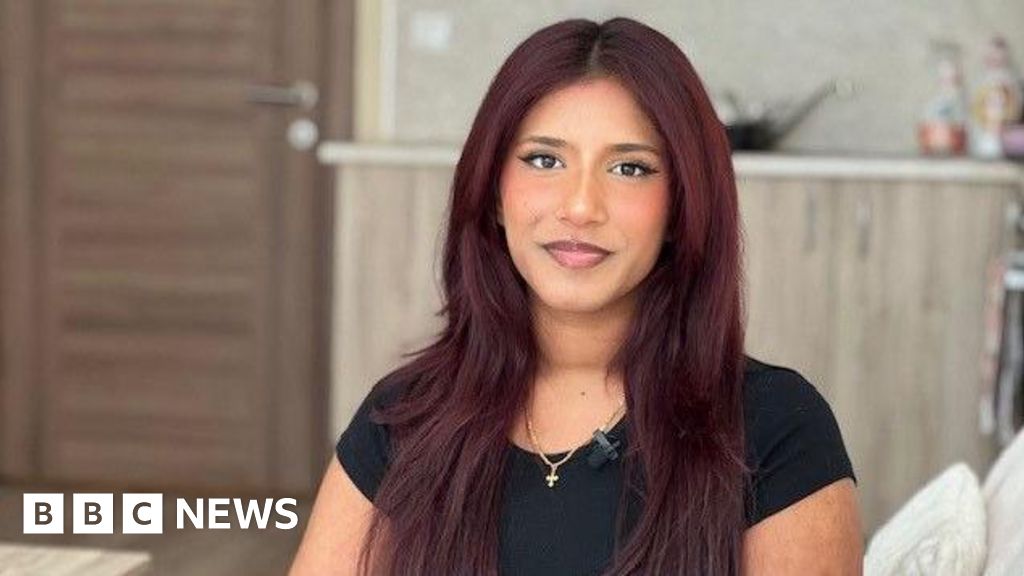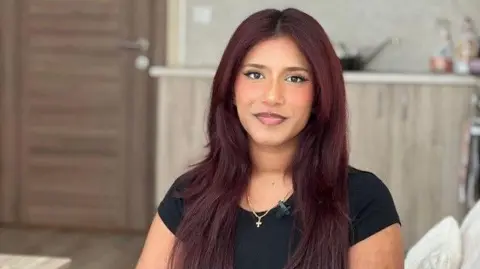 BBC
BBC
Freya Mandapalli, 19, is among many medical students who are choosing to study abroad
A growing number of young people are choosing to study in Eastern Europe due to a strict cap on medical school places in the UK.
Freya Mandapalli from Preston is one of them.
The 19-year-old has healthcare in her blood. Her parents both work at the local hospital and her older sister studied medicine at Edinburgh and now works as a doctor.
“I just got inspired by her really,” Freya said.
But getting into a medical school in the UK generally requires a minimum of three As at A-level and high grades in other subjects and Freya struggled to get them.
Although she got interviews, she didn’t receive any offers.
She considered a gap year but then a family friend mentioned the possibility of studying in Plovdiv, in Southern Bulgaria.
“I was really nervous to start with, but the city’s beautiful and I’ve found some great friends,” added Freya, who has just started her second year of a medical degree.
In England around 8,126 medical students started this academic year, just over a thousand of them in the North West.
This is sharply up from two years ago when it was just 7,010 but still far short of the 15,000 the government says it needs for England by 2031 to meet demand.
But with the cap on medical school places, it means competition to get one is intense, and many students are voting with their feet.
‘Word of mouth’
Mohammed Adnaan Patel from Bolton has just started his fifth year at the same university in Plovdiv. He too found the course through word of mouth.
“One of my friends told me that his brother already studies within Bulgaria and he was planning on going himself,” he said.
“My mother was very worried, my father wanted me to stay strong and be independent, but the rest of my family didn’t know what to expect. But those worries gradually subsided.”
The Medical University of Plovdiv is one of Bulgaria’s most prestigious medical schools and attracts many more applicants than it admits. Although it does ask for academic qualifications, a large part of the admissions process hangs on an entrance exam.
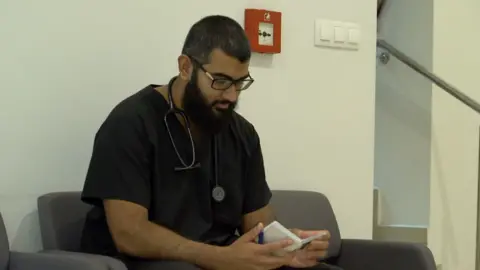
Mohammed Adnaan Patel from Bolton is now in his fifth year at the university in Plovdiv
Veselina Goranova, vice rector for Education, says their students’ home countries include Greece, Turkey, Italy, Germany, Canada, the US – but added the biggest group by far, “about 40% come from the UK”.
That may be in part because classes for international students are held in English but also because a well-established network of agencies now exist to help those hoping to make the leap.
Dr Muhammad Hamza from Blackburn graduated from Plovdiv last year and is currently back there helping to settle new students.
He works with MedConnect Europe Ltd, an agency headquartered in London but with offices around Eastern Europe.
He says the agency helps new students navigate the complications of a new life abroad like finding a flat, dealing with paperwork, and sorting out life’s essentials.
“We get them in touch with the estate agents, we book the flights for them. Our representatives will be there at the airport to collect them, take them to the hotels,” he said.
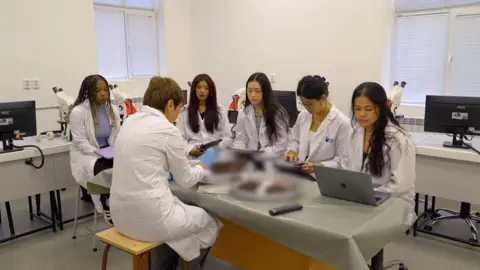
Medical students, including Freya, are studying in Bulgaria instead of the UK
Strict timetable
“We help them with shopping – buying bedding, cutlery..wifi, mobile sims, setting them up. Because they don’t know the language and we have representatives in each country which do know the language it becomes so much easier,” he added.
Dr Hamza spends most of his time working as a private dentist in Chorley, where he spends a year with a mentor.
The firm, he says, came out to Plovdiv to recruit dentists there.
“It’s probably because of the vast practical experience we get in Bulgaria,” he said, adding that the Bulgarian system requires students to complete large numbers of relatively complex procedures.
“So going and starting as a dentist in the UK, I already had somewhat of a solid foundation.”
New students need to get used to a strict timetable which often begins at 7.30am and may not finish until 6pm.
They also need to study Bulgarian so they can talk to the patients they will be treating in the last three years of their course.
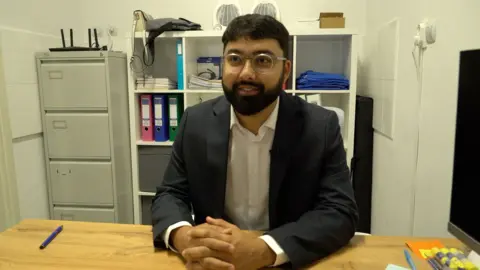
Dr Hamza now works as a Dentist in Chorley after studying in Bulgaria
Bulgarian, like Russian, uses the Cyrillic alphabet, and a complex grammar structure.
Milena Muleshkova is one of those tasked with getting the students up to scratch.
She says that first year is about everyday communication, while the second-year concentrates on medical terms.
Medical courses in Bulgaria last six years, one year longer than in the UK but common in mainland Europe.
At the end of it, successful students have a degree which is recognised by the General Medical Council in England, and which allows them to practice in the NHS without any further tests.
BBC World Service: Why are medical students going to Bulgaria?
This may change though in 2028 when Britain next looks at its agreements with the EU.
And another potential change is particularly worrying some students.
The NHS has become increasingly reliant on attracting healthcare staff from overseas to meet increasing patient demand.
In 2023 68% of doctors joining the NHS were international medical graduates (IMGs) and the number has been rising year on year.
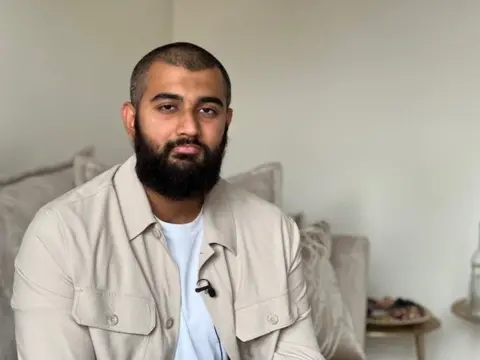
There is uncertainty around the future of qualifications medical students gain from studying in Bulgaria
Currently the NHS treats applicants from overseas and the UK in the same way for jobs and training opportunities.
This has become an increasingly contentious issue for resident (formerly known as junior) doctors in England who say many at the beginning of their career are being denied the opportunity to progress.
Earlier this month they voted to strike over the shortage of speciality training places.
But the doctors’ union the British Medical Association wants UK graduates to be prioritised for those training posts.
Health Secretary Wes Streeting says he agrees.
But this could mean British students studying abroad would also be looked at less favourably because they would also be classed as IMGs.
‘It’s quite scary’
Mohammed Adnaan Patel said he did have sympathy with much of the argument but not all.
He said: “It’s quite a topic of frequent discussion as the years go on as we get closer to that stage,”
“It is quite scary. It does raise a lot of anxiety within the students and myself.”
But the NHS also has difficulty keeping hold of medical staff.
Last year in the North West of England one in ten left – although that was actually better than the year before.
Some will have left the profession altogether but some will have been tempted away by similar jobs in Canada, Australia, and the gulf states, who also run international recruitment campaigns.
As the global population ages and healthcare needs increase, the international fight to attract trained medical staff, wherever they come from, is likely to intensify.
Dr Muhammad Hamza from MedConnect Europe says he doesn’t see the demand for European students slowing any time soon.
He said: “I see it growing because the demand for doctors and dentists, not only in the UK is a lot but all over the world”
“I don’t see it slowing down. It’s going to expand further and further.”

